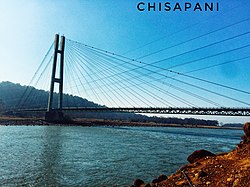Karnali Bridge
This article needs additional citations for verification. (December 2013) |
Karnali Bridge (कर्णाली पुल) | |
|---|---|
 Bridge on Karnali river at chisapani | |
| Coordinates | 28°38′N 81°17′E / 28.64°N 81.28°E |
| Crosses | Karnali River |
| Locale | Chisapani, Kailali |
| Maintained by | Lamki Chuha Municipality, Kailali |
| Characteristics | |
| Design | asymmetric, single-tower, cable-stayed bridge |
| Total length | 500 m (1,640.4 ft) |
| Width | 11.30 m (37.1 ft) |
| Height | 120 m (393.7 ft) |
| Longest span | 325 m (1,066.3 ft) |
| No. of spans | 2 |
| History | |
| Designer | Steinman, Boynton, Gronquist & Birdsall |
| Constructed by | Kawasaki Heavy Industries, Japan |
| Opened | 1994 |
| Location | |
 | |

Karnali Bridge, the asymmetric, single-tower, cable-stayed bridge is the second longest of its type in Nepal and was built by international collaboration between USA, Japan and Nepal.[1]
Overview
It is the first and only cable-stayed bridge in the country till date.[1] The bridge spans the Karnali River between the Kailali District and Bardiya District of western Nepal. The bridge was designed by Steinman, Boynton, Gronquist & Birdsall of USA, constructed by Kawasaki Heavy Industries of Japan[2] and funded by the World Bank.[3] It was inaugurated after six years of its construction date by the late Prime Minister Girija Prasad Koirala.
Location
The bridge lies in Mahendra Highway at Chisapani at the border of Kailali and Bardiya district. The bridge site is 500 km from the capital city of Kathmandu, and 86 km from the closest airport facilities in Dhangadhi. The design of the bridge and its location have made it a tourist attraction for domestic and international visitors. The nearest city to the Karnali Bridge is the town of Chisapani in Far-Western Region, Nepal.[4]
See also
References
- ^ a b Shrestha, Bipin (2014-07-31). "Karnali Cable-Stayed Bridge: Development of Finite Element Model and Free Vibration Analysis". Journal of the Institute of Engineering. 10 (1): 14–24. doi:10.3126/jie.v10i1.10873. ISSN 1810-3383.
- ^ Maeda, M.; Nakamura, K.; Shimodoi, H.; Amako, M.; Miyoshi, S.; Haruta, M.; Okada, S.; Kuroki, S. (1904-07-20). "Construction of a composite cable stayed bridge. Karnali river bridge in Nepal. Gosei shachokyo no kensetsu. Karnali kawa kyoryo". Kawasaki Juko Giho (K.H.I. Technical Review); (Japan) (in Japanese). 122.
- ^ Dave Reed; James McConnachie (2015-07-01). "The western terai- the far west". The Rough Guide to Nepal. Rough Guides UK. pp. 276–277. ISBN 978-0-241-23810-3.
- ^ "Chisapani: Nepal's untamed far west - OnlineKhabar English News". 2018-09-28. Retrieved 2022-07-18.
The Karnali River Bridge was designed by Steinman, a firm that was later incorporated into the Parsons Corporation, USA. Kawasaki Heavy Industries constructed the bridge.
External links
- Karnali River Bridge in Structurae
- Karnali Bridge at Sundarsudurpaschim.org
